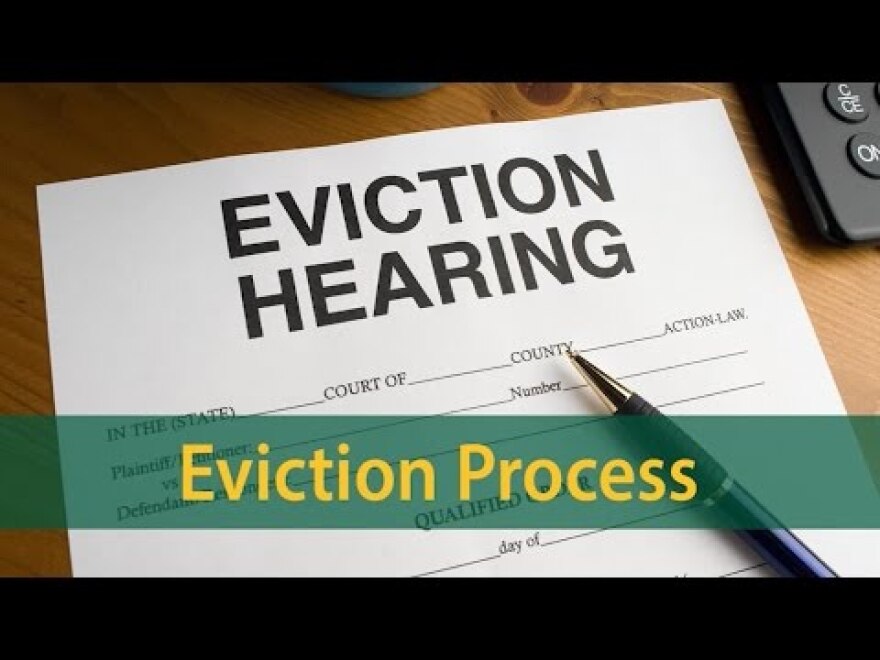With many Alaskans struggling to pay rent during the pandemic, housing advocates welcomed news of a temporary moratorium on evictions. It went into effect 10 days ago (Sept. 4) by order from the Centers for Disease Control and Prevention. It means to keep tenants in their homes even if they can’t pay their landlords right now. But tenants must show they’ve tried everything to come up with the money.
In the beginning of the pandemic, a state law prevented almost all evictions for failure to pay rent; that protection ended June 30. Since then, evictions have been proceeding in Alaska’s courts, until the CDC issued its order on September 4. The moratorium is in effect until December 31. Dan Coons, the Fair Housing Coordinator for Alaska Legal Services, says the moratorium can protect tenants this fall if they fill out a declaration form from the CDC.
“Well it should prevent their landlord from filing an eviction action against them, and if a landlord does file an eviction action against them the court should not move forward on it. As long as they can show they have done this declaration and then nothing should happen until the new year.”
The declaration form, which you can find at AlaskaLawHelp.org, and for your convenience, we’ve posted it with the web version of this story at KUAC.org is a pledge that the tenant
- has tried to get government help for rent or housing.
- Does not expect to earn more than $99,000 this year (or double that, if you're filing as a couple).
- is doing one’s best to make some kind of payment.
- but can't pay rent because of loss of income, loss of work or big medical bills.
- And would be homeless if evicted— or you'd move into shared, close quarters.
- You understand that you must still make rent.
- You understand that after the order ends on Dec. 31, your landlord can ask for all missed payments and evict you.
And each person on a lease makes these statements under penalty of perjury.
AlaskaLawHelp.org has newly updated self-help information regarding COVID-19, evictions, and housing rights in Alaska. If you received an eviction notice and want to apply for legal services, you can call the ALSC intake line at 1-888-478-2572.
There is an FAQ page for tenants and landlords on the Alaska Court System website: https://courts.alaska.gov/covid19/evictions-faq.htm
The moratorium only protects failure to pay rent. The CDC Order allows eviction cases if the tenant is:
- engaging in criminal activity on the premises;
- threatening the health or safety of other tenants;
- damaging or posing an immediate and significant risk of damage to the property;
- violating building codes or health ordinances related to health and safety; or
- violating any of the terms of the rental agreement other than the timely payment of rent.
The moratorium will help tenants who can’t pay rent, but it is not rent forgiveness, it is rent deferral. That means, come January 1, all the back rent is due.
“This CDC moratorium is a useful measure for putting off the crisis, but if the rent isn’t getting paid in the meantime, that crisis will come in the middle of winter.”
Michael Sanders is the Housing and Homeless Coordinator for the City of Fairbanks. He says it is important to identify sources of emergency funds as soon as possible, before someone gets an eviction notice. He says the Fairbanks Homeless Coalition has been working with Fairbanks and statewide non-profits on an eviction Prevention and Diversion program since last December.
“It’s really important for folks to reach out early if they start to fall behind on rent -- reach out to the Prevention and Diversion programs at Love, INC. or the Salvation Army or AHFC or any of the housing agencies.”
Sanders says the Homeless Coalition was expecting to see a wave of evictions in Fairbanks and North Pole during the pandemic, and therefore, a lot of requests for the Prevention and Diversion money now set up through Love INC and the Salvation Army, two faith-based charities who are part of the Coalition. Surprisingly, he says, that hasn’t happened, and he attributes that to the federal, state and local stimulus handouts.
“So AHFC, the Alaska Housing Finance Corporation, had funds specifically for folks who are struggling with rent, and then the City’s CARES fund; there was a portion of that if they lived inside the city limits, and then the early PFD, and all these other funds; they have stayed off a big wave of people being evicted.”
Jason Kempthorne is the Executive Director of Love in the name of Christ, or Love, INC. He says the rent assistance money he is handing out was provided to the Coalition from the Alaska Mental Health Trust. He says without large grants, the charities would be overwhelmed.
“There have been days in the program where we receive requests for $40 - $50,000 worth of rental assistance in one morning. People calling in and saying “I need help.”
Your individual donations are not going to be enough to help that family, that’s why we go after the government funding to help out.”
Love, INC is also the contractor hired by the City of Fairbanks to disburse CARES money allocated to the City. Some of that was designated to individuals and families for housing.


